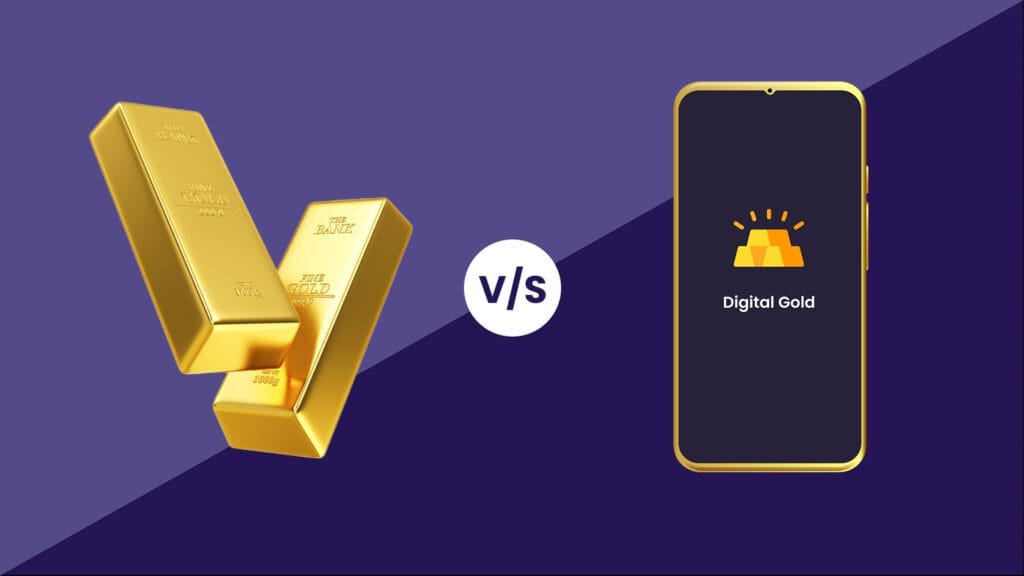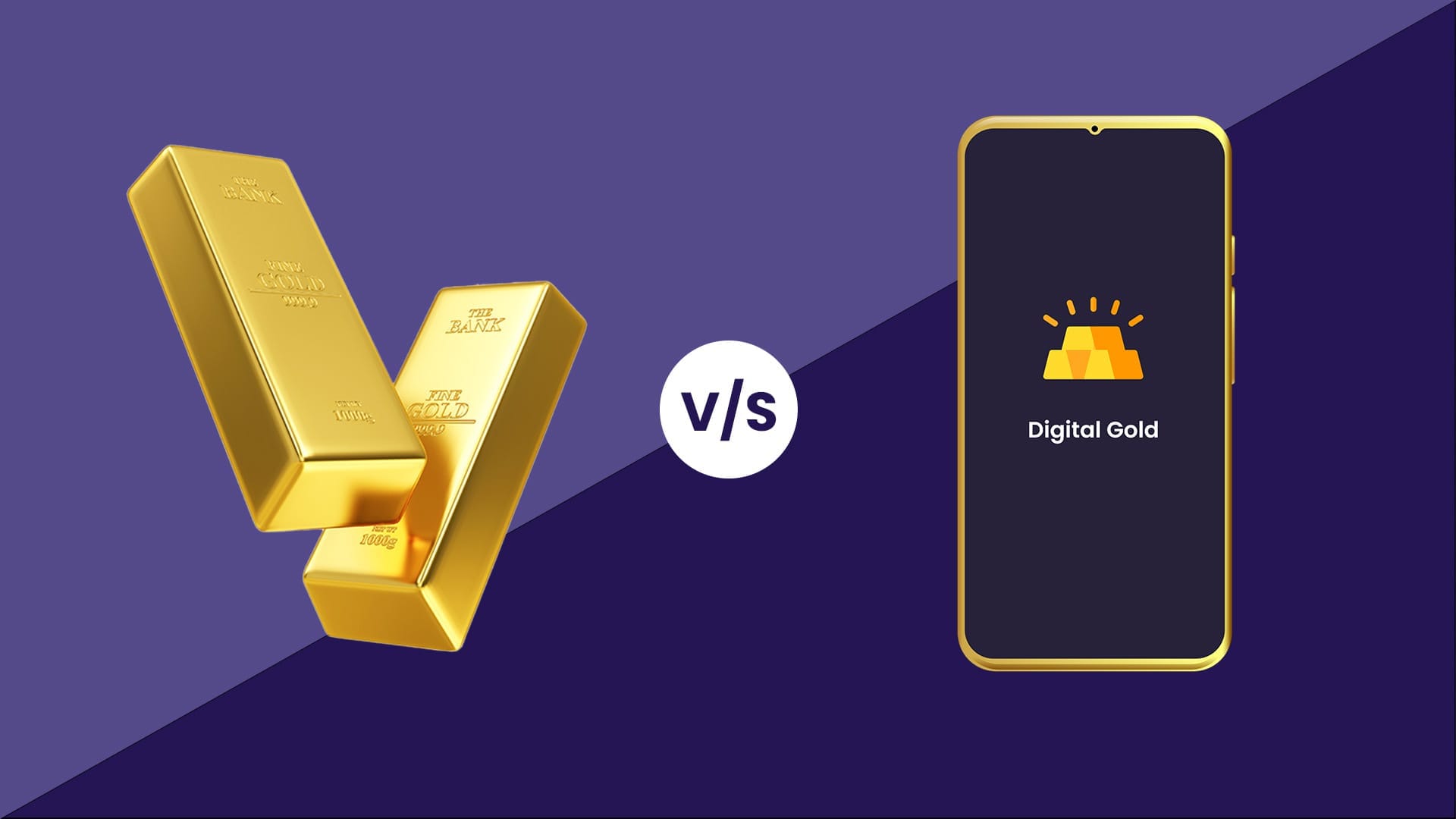Table of Contents
- Introduction: You’ve Made the Wise Decision, What’s Next?
- Understanding Physical Gold: A Real Asset in Your Hands
- Understanding Gold Accounts (Paper Gold): Convenience at Your Fingertips
- The Final Decision: So, Which Option is Best for You?
- Conclusion: It’s Not About Which is Better, But Which is More Suitable
Introduction: You’ve Made the Wise Decision, What’s Next?
You have already made an incredibly wise decision: to start saving in gold. Congratulations! You’ve chosen to no longer let your hard-earned money be silently eroded by inflation. Instead, you’ve opted to protect it with an asset that has proven its worth for over 6,000 years. But now, you face another important crossroads, a major choice that will define what your gold-saving journey looks like. Should you buy gold that you can hold, touch, and store yourself (i.e., Physical Gold), or is it enough to simply open a gold savings account at a bank or other financial institution?
This contest between Physical Gold vs a gold account is crucial to understand, because it isn’t just a matter of personal preference. Your choice will have a direct impact on your level of control, security, flexibility, and potential profitability in the future. Both options have their own distinct advantages and disadvantages, and the right choice depends entirely on your primary goals. Are you a long-term saver who desires absolute protection, or are you an active investor who values convenience? Let’s dissect these two options in detail.
Understanding Physical Gold: A Real Asset in Your Hands


Physical Gold refers to gold in a tangible form that you can see and hold, such as bars, coins (like the Britannia or Sovereign), or other bullion items. This is the most traditional, purest, and most fundamental method of gold ownership. When people spoke of ‘saving in gold’ for thousands of years, this is precisely what they meant. In the debate of Physical Gold vs a gold account, this option offers absolute control, security, and freedom. It is a real, tangible asset that exists completely outside of the digital banking and financial system, making it the ultimate defensive financial stronghold.
1. Benefit 1: You Hold 100% Control (Zero Counterparty Risk)
When you purchase a Physical Gold bar or coin and take it home, that asset is 100% yours, without question. You can store it wherever you wish—in a high-quality safe at home, in a safe deposit box at a bank, or anywhere else you deem secure. It is not tied to any financial institution, it does not exist as a number on a computer system, and it doesn’t require anyone’s permission for you to access it. It belongs to you, absolutely. Owning Physical Gold grants you true financial sovereignty.
The benefit of this in terms of security is enormous. Your wealth is safe from any ‘counterparty risk’. This means it is safe from systemic risks such as bank failures, liquidity crises, or government sanctions. If a bank runs into trouble, your gold account held with them could be affected or frozen for a prolonged period. But the Physical Gold you store yourself will be completely untouched. You are the ultimate custodian of your own wealth, providing a level of peace of mind that no other financial product can match. This is the true essence of owning Physical Gold.
2. Benefit 2: The Ultimate Advantage – Can Be Used as Collateral for Instant Liquidity
This is arguably the most significant and practical advantage in the Physical Gold vs gold account comparison. Imagine you are facing a financial emergency. Your car breaks down and you need Rm 3,000 for immediate repairs. If your savings are in a gold account, your only option to get cash is to sell your holdings, possibly at an unfavourable price at that moment. But if you have Physical Gold, you have a much better option: using it as collateral.
You can take your Physical Gold bar or coin to a reputable pawnbroker or a specialised lender and secure a loan against it instantly. The process is fast and discreet. The benefit is that you get the cash liquidity you need without having to sell your precious asset. Once your finances are stable again, you can repay the loan and reclaim your Physical Gold. It effectively works as your own personal ATM or emergency fund, providing incredible financial flexibility that a paper account simply cannot offer. The utility of Physical Gold in a crisis is unmatched.
3. The Drawbacks: Storage and Spreads Must Be Considered
Of course, with full control comes full responsibility. The main drawback of owning Physical Gold is that you must think about how to store it securely. This is a serious consideration. Storing it at home requires investing in a quality safe and perhaps an alarm system, and there is still a risk of theft.
Storing it in a safe deposit box at a bank involves annual rental fees and you can only access it during banking hours. You need to weigh the costs against the level of security you desire. Additionally, the ‘spread’ (the difference between the selling price and the buy-back price) on smaller Physical Gold items (like a 1-gram bar) can be slightly higher than with a gold account, often around 6-9%.
Understanding Gold Accounts (Paper Gold): Convenience at Your Fingertips


A gold account (also known as paper gold or a gold savings account) is offered by many major banks and financial platforms. It works much like a standard bank account, but instead of holding Ringgit, your account records your ownership in grams of gold. It allows you to buy and sell gold easily via an account statement, without ever needing to handle the physical metal itself. In the contest of Physical Gold vs a gold account, this option is the clear winner in terms of convenience and accessibility, making it very popular among modern investors.
1. Benefit 1: Extremely Easy and Instantly Accessible
This is the main, undeniable appeal of a gold account. You can buy or sell gold from the comfort of your home using just your mobile phone or computer, at any time (during the institution’s trading hours). There’s no need to worry about queuing at a dealer, driving home with a valuable asset, or figuring out where to store it safely. All of that is handled by the bank or provider. The benefit is that it is perfectly suited for those with busy lifestyles who want a fast, seamless process and don’t want the headache of dealing with the logistics of storing Physical Gold.
2. Benefit 2: Low Entry Point and Competitive Spreads
Gold accounts have lowered the barrier to entry for anyone wanting to invest in gold. You don’t have to wait until you have thousands of Ringgit to buy a large bar. Most providers allow you to start buying gold with a capital as low as 1 gram or even just RM 100. Some providers also offer very low ‘spreads’ (sometimes as low as 1-2%), which allows you to potentially profit more quickly if your main goal is to trade on market price movements. The benefit is that it makes gold investment more democratic and accessible to people of all income levels.
3. The Critical Drawbacks: You Don’t Hold Real Gold and Can’t Use It as Collateral
This is the biggest and most critical weakness in the Physical Gold vs gold account comparison. When you buy gold through a typical bank account, you don’t actually own a specific, numbered gold bar. You own an ‘unallocated claim’ on the total pool of gold held by the bank. This means you are exposed to counterparty risk. More importantly from a practical standpoint, because you are not holding the metal physically, you cannot take it to a pawnbroker to secure a loan. If you need cash, your only option is to sell your holdings, even if the price is low at that moment, potentially forcing you into a loss. Your financial flexibility is drastically reduced without Physical Gold.
The Final Decision: So, Which Option is Best for You?


After weighing up the pros and cons of both options, the answer depends entirely on your primary goal. There is no single “correct” answer for everyone. The debate over Physical Gold vs a gold account is resolved by asking yourself the most important question: “What is my main purpose for buying gold?”. Let’s summarise the different scenarios to help you make the right choice.
1. Choose PHYSICAL GOLD if:
Your main objective is long-term wealth protection, serving as your financial insurance. You want the absolute flexibility to get cash via a secured loan during an emergency without having to sell your asset. You are also someone who is more comfortable holding your assets yourself, free from the banking system, and you do not want to be exposed to third-party risk. For you, owning Physical Gold is about peace of mind and personal financial sovereignty. You see it as a legacy saving for future generations. Your goal is to hold, not to trade.
2. Choose a GOLD ACCOUNT if:
Your main objective is to actively trade to make short- or medium-term profits from price movements. You place a high value on convenience, transaction speed, and a low ‘spread’ to maximise your trading profits. You also want to start investing with a very small amount of capital and don’t want to think about storage. You understand and are comfortable with the fact that you do not own real Physical Gold and cannot use this asset as collateral. Your focus is on capital gain, not asset ownership.
3. The Hybrid Strategy: Utilise the Strengths of Both!
For many savvy investors, the answer to the Physical Gold vs gold account dilemma is not “one or the other,” but “both.” You can and should employ a hybrid strategy that leverages the advantages of each option. Use Physical Gold (such as bars and coins) as the core of your long-term savings—your ‘insurance fund’ that you will not touch unless there is a real emergency. This is your solid wealth foundation. At the same time, use a gold account to make small, consistent monthly purchases (dollar-cost averaging) or to tactically take advantage of market dips without having to leave your home.
Conclusion: It’s Not About Which is Better, But Which is More Suitable
The battle between Physical Gold vs a gold account doesn’t really have an absolute winner, because both are designed to serve different goals and different types of investors. A gold account offers unparalleled convenience for traders and beginners, while Physical Gold offers superior security, control, and flexibility for the long-term saver. The best choice always depends on your personal strategy and goals—your ‘why’ for buying gold in the first place.
However, if we return to the original purpose of gold ownership—as a truly safe, system-independent store of value that can be passed down through generations—then nothing can beat the advantages and peace of mind that come from holding a piece of Physical Gold in your own hands. Understand your goals first. If you want protection and financial flexibility, prioritise Physical Gold. If you want convenience and trading, a gold account might be the answer. Or, be a savvy investor and use both to build a truly robust and future-proof gold portfolio.





